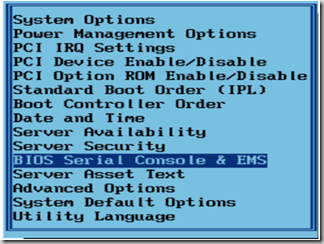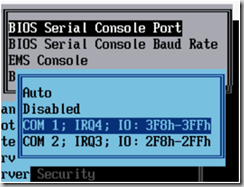为什么要使用Serial Console
远程机器的系统管理
通常情况,安装linux的服务器一般用来承载重要的服务,如DHCP,DNS等等。一般对于这些服务器的管理通过远程访问进行,如SSH,Telnet 等等。但是,有些时候,有些情况下,使用远程访问是无法解决问题的,如处理一些导致系统crash的错误或者bug,这是可以通过Serial console来访问这些主机就显得尤其重要。
记录console信息
对于内核开发者来说,有些重要的内核信息会系统出错的时候,启动的时候一闪而过。而通过Serial Console可以很方便的将这些重要的信息记录下,以供分析和排错使用。
还要其他很多地方,如嵌入式软件开发,serial console也是必不可少的工具。
配置Serial Console
配置serial console一般主要有以下几个步骤
[1] 设置BIOS, 打开serial port功能
[2] 如果需要,需要配置bootloader(),使得bootloader可以使用serial port。
[3] 配置kernel的启动命令行参数,通过设置console 选项。
[4] 需要配置init进程,使其可以spawn一个进程来监控serial console上的login请求。(getty)
[5] 其他系统工具需要配置后,使其可以同serial console以前正常工作。
接下来,本文主要总结前4步的一般步骤。
设置BIOS
不同的机器BIOS配置不尽相同。但一般会有类似的选项,如:
设置好相应的Port和Buad rate即可。
设置Boot loader
这里以grub (GNU GRUB 0.97)为例。
serial --unit=0 --speed=115200
terminal --timeout=10 serial console
#splashimage=(hd0,0)/grub/splash.xpm.gz
hiddenmenu
title Red Hat Enterprise Linux Server (2.6.18-prep-yubo)
root (hd0,0)
kernel /vmlinuz-2.6.18-prep-yubo ro root=/dev/VolGroup00/LogVol00 rhgb quiet crashkernel=128M@16M console=tty0 console=ttyS0,115200
initrd /initrd-2.6.18-prep-yubo.img
title Red Hat Enterprise Linux Server (2.6.18-194.el5)
root (hd0,0)
kernel /vmlinuz-2.6.18-194.el5 ro root=/dev/VolGroup00/LogVol00 rhgb quiet crashkernel=128M@16M console=tty0 console=ttyS0,115200
initrd /initrd-2.6.18-194.el5.img
在如上的例子配置文件当中,红字部分是需要注意的部分。
serial --unit=0 --speed=115200
terminal --timeout=10 serial console
这两行配置文件来配置grub同时使用serial和console, 这里的使用的COM1(--unit=0,GRUB 里serial port是从0开始计数,所以--unit=0是使用com1),波特率为115200。所以,serial port和console(这是是连接的键盘和显示器)会同时等待最多—timeout ,以等待用户输入。
配置kernel启动参数
linux kernel通过console 参数,来配置选择哪个console, console参数可以重复出现,但是,对于每一种console技术,它仅能出现一次。
如:
console=tty0 console=lp0 console=ttyS0
是有效的参数,
但是
console=ttyS0 console=ttyS1
是不能接受的,因为ttyS0和ttyS1是同种console技术,都是serial。
【注意】当console参数出现多次时,最后一个console选项的值被linux kernel用来作为/dev/console设备。
serial --unit=0 --speed=115200
terminal --timeout=10 serial console
#splashimage=(hd0,0)/grub/splash.xpm.gz
hiddenmenu
title Red Hat Enterprise Linux Server (2.6.18-prep-yubo)
root (hd0,0)
kernel /vmlinuz-2.6.18-prep-yubo ro root=/dev/VolGroup00/LogVol00 rhgb quiet crashkernel=128M@16M console=tty0 console=ttyS0,115200
initrd /initrd-2.6.18-prep-yubo.img
title Red Hat Enterprise Linux Server (2.6.18-194.el5)
root (hd0,0)
kernel /vmlinuz-2.6.18-194.el5 ro root=/dev/VolGroup00/LogVol00 rhgb quiet crashkernel=128M@16M console=tty0 console=ttyS0,115200
initrd /initrd-2.6.18-194.el5.img
对于console=tty0 console=ttyS0,115200设置,kernel的信息会同时出现在tty0和ttyS0上,但是init进程的输出信息仅出现在ttyS0上,直到login: 提示信息出现在console和tty0上为止。
配置getty
需要配置inittab使得有getty进程监视ttySX, 从而可以从serial console登陆,进而对系统进行访问。
# Run gettys in standard runlevels
1:2345:respawn:/sbin/mingetty tty1
2:2345:respawn:/sbin/mingetty tty2
3:2345:respawn:/sbin/mingetty tty3
4:2345:respawn:/sbin/mingetty tty4
5:2345:respawn:/sbin/mingetty tty5
6:2345:respawn:/sbin/mingetty tty6
S0:2345:respawn:/sbin/agetty -L ttyS0 115200 vt100
如上例红字部分,启动agetty –L 来对ttyS0(COM1)进行监视。
如果系统使用root通过ttyS0来登陆系统,还需要对/etc/securetty进行修改。
tty9
tty10
tty11
ttyS0
红字部分为添加的内容。
到这里,serial console的配置就基本完成了。
参考:
【1】http://tldp.org/HOWTO/Remote-Serial-Console-HOWTO/
【2】Linux kernel Documentaion “kernel-src/Documentation/serial-console.txt”

